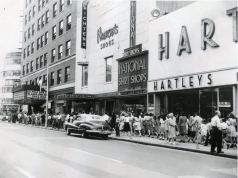Haz click aquí para leer la versión en español
On the last day of the 75th anniversary gathering of the Interamerican Press Association at the Biltmore hotel in Coral Gables, Senator Marco Rubio, ex-presidents from Latina America, and journalist Jorge Ramos spoke about freedom of the press and the role of social media.
The conversation covered in turn the power of journalism to change authoritarian regimes and how social media serves as an information source..
“Technological changes have transformed the way information flows,” Rubio said. “I don’t believe that ever in history has humanity had more information in the hands of the people. This is positive but it has also divided people.”
He also explained that social media can be used as a strategy, and that it is important to learn to distinguish what is important. “I recognize that President Trump knows how to manage social media. He has dominated the news almost every day since July of 2015. That’s no accident. It’s a strategy. We have to distinguish between what’s relevant and what’s not, because if we don’t, we’ll just spend all day reacting to it.”
The theme of Venezuela and oppressive governments was central to the conversations amongst the panelists. Ramos spoke of his experience interviewing dictators like Maduro and also explained what is the central role of a journalist. “What journalists have to do is base ourselves in facts, data and statements, no more,” said Ramos.
“Journalism doesn’t happen just because,” Ramos said. He admitted that his confrontation with President Trump during a controversial 2015 interview was planned, and that he was prepared with microphones and cameras. “To confront power is the job of the journalist and this is why I decided to face Donald Trump and continue with my questions.”
Ramos explained that his experience during the 2015 interview with Donald Trump, after which he was expelled, was similar to that with Fidel Castro, who also kicked him out during questioning. “This type of authoritarian regime, this type of racial expressions are from the same person who we have today as president,” he said. “That is why, as journalists, we don’t have any alternative but to confront power.”
At the beginning of June, he repeated the experience and was thrown out of the Miramar Palace in Venezuela while interviewing President Maduro and asking if he was a dictator. “When it comes to leaders, dictators or presidents, I arrive with two ideas,” explained Ramos. “The first one is that if I don’t ask a question, someone else will. And the second is that I assume I will never speak to that person again. That is how I conduct my interviews.”
































